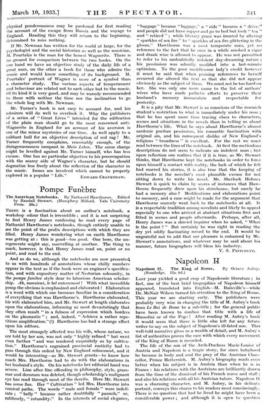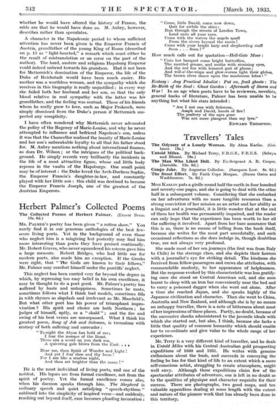Napoleon IT Napoleon II. The King of Rome. By Octavo
Aubry. (Routledge. 12s. 6d.) LAST year yielded a good crop of Napoleonic literature ; in fact, one of the best brief biographies of Napoleon himself appeared, translated into English—M. Bainville's—while Dr. McNair Wilson turned his attention to the King of Rome. This year we are starting early. The publishers were probably very wise in changing the title of M. Aubry's book from Le Roi de Rome to a sub-title ; for the general public have been known to confuse that title with a life of Mussolini or of the Pope ! After reading M. Aubry's book it would seem that there is little else left for any future writer to say on the subject of Napoleon's ill-fated son. This well-told narrative gives us a wealth of detail, and M. Aubry's list of authorities proves the care with which every movement of the King of Rome is recorded.
The life of the son of the Arch-Duchess Marie-Louise of Austria and Napoleon is a tragic story, for since babyhood he became in body and soul the prey of the Austrian Chan- cellor, Prince Metternich. M. Aubry's biography reads even better when his subject is in Austria than when he is in France : his relations with the Austrians are brilliantly drawn from the time of the dismissal of his French nurse and staff ; and also his relations with all his Austrian tutors. Napoleon I I was a charming character, and M. Aubry, in his delicate portrait, conveys this charm to his readers most convincingly. There is no question that had he lived he might have been a considerable power ; and although it is open to question whether he would have altered the history of France, the odds are that he would have done so. M. Aubry, however, describes rather than speculates.
A character in the Napoleonic period to whom sufficient attention has never been given is the Emperor Francis of Austria, grandfather of the young King of Rome (described on p. 15 as " light-hearted," a remark which must either be the result of mistranslation or- an error on the part of the author). The hard, austere and religious Hapsburg Emperor could indeed unbend towards his grandson. Had it not been for Metternich's domination of the Emperor, the life of the Duke of Reichstadt would have been much easier. His mother was a worthless woman, and the sympathy which she receives in this biography is really unjustified ; in every way she failed both her husband and her son, so that the only blood relative in real sympathy with the latter was his grandfather, and the feeling was mutual. Those of his friends whom he really grew to love, such as Major Prokesch, were simply dismissed from the Duke's person if Metternich sus- pected any complicity.
I have often wondered why Metternich never advocated the policy of the Regency of Marie-Louise, and why he never attempted to influence and befriend Napoleon's son, unless it was that the Chancellor realized the inanity of Marie-Louise and her son's unbreakable loyalty to all that his father stood for. M. Aubry mentions nothing about international finance, as does Dr. Wilson ; or the intrigues of the political back- ground. He simply records very brilliantly the incidents in the life of a most attractive figure, whose sad little body reposes in the vaults of the Hapsburgs. One small point may be of interest : the Duke loved the Arch-Duchess Sophie, the Emperor Francis's daughter-in-law, and constantly played with her little son : this child was destined to become the Emperor Francis Joseph, one of the greatest of the Austrian Emperors.







































 Previous page
Previous page